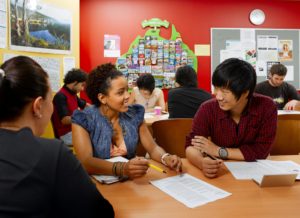Getting refugees into work a triple win – report
Supporting newly arrived refugees to get work more quickly would pay off for Australia on three fronts – helping the nation’s bottom line, benefiting vulnerable people, and enhancing integration and social cohesion – according to a new report says.
Then study shows just 17 per cent of refugees are in paid work 18 months after arriving in Australia, and most are in jobs with limited prospects.
It found many refugees who do find work in Australia take jobs below their skill or qualification level.
 About 60 per cent held highly skilled jobs in their home countries, while just 26 per cent find similar-level work in Australia.
About 60 per cent held highly skilled jobs in their home countries, while just 26 per cent find similar-level work in Australia.
The report, titled Settling Better by the Centre for Policy Development and Boston Consulting, found two out of five refugees find work as labourers or machinery operators and that demand for low skilled work is diminishing in Australia’s transitioning economy.
The report identified five key barriers to refugees entering the workforce: limited English, a lack of work experience, poor health, limited opportunities for women and having been in Australia for a short period.
Among the barriers, English language is a key factor in finding work.
Around 85 per cent of refugees who speak English well are in the labour market, compared with 15 per cent who do not speak English well.
The report said getting more refugees into work more quickly is the “bedrock for successful settlement”.
“While employment rates improve with time, to get more refugees into jobs more quickly would be a triple win: it would benefit vulnerable people, boost the budget and improve social cohesion,” said lead author Henry Sherrell.
He said that if labour market outcomes could be improved by 25 per cent, refugees could earn an additional $2.5 billion over a decade, adding $1 billion to government taxes and savings.
The report identified practical steps Australia could take to improve refugees’ chances of finding sustainable work in Australia.
It recommended investment in targeted employment assistance focused on the barriers identified, leveraging overseas best practice through better skills recognition, better private employer and community sponsorship options, as well as microfinance programs, particularly for women.
“There is plenty of evidence that settling humanitarian migrants better will have substantial payoffs. Statistics show that refugees are more entrepreneurial than other migrants and that over time they can catch up with others in the job market,” Mr Sherrell said.
“But there is potential to accelerate their entry into work to the benefit of all. If the labour market outcomes for just one year’s intake of humanitarian migrants improved by 25 per cent, then over the subsequent decade those new arrivals would be $465 million better off and the Australian Government would bank $175 million in budget savings,” he said.
“To achieve this outcome year on year would compound the benefits, producing additional income for humanitarian migrants of close to $2.5 billion and a gain of almost $1 billion for the Australian Government over the subsequent decade.
“The rewards from this growing dividend are far more than financial. Expanding employment opportunities for refugees is central to successful integration.
“Better job outcomes will strengthen social cohesion and help reduce alienation and extremism – not just amongst refugees, but also amongst those established members of the Australian community who might fear or resent the presence of newcomers.
“If Australia is to remain a leader in refugee resettlement then we must adapt in the face of change. Political leadership and investment must nurture the public legitimacy that forms the bedrock of the humanitarian program.
“As our economy changes and demand for low-skill labour drops, it will only become harder for humanitarian migrants to secure work. We need to act now,” Mr Sherrell said.
Laurie Nowell
AMES Australia Senior Journalist












